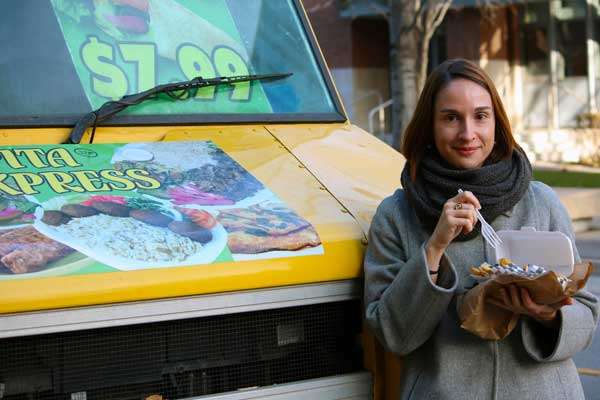Street food—the impact and allure of this "dangerous culinary practice"

Some people chase their dreams but the University of Toronto's Irina D. Mihalache spends a lot of time focusing on people who chase – food trucks?
Mihalache is an assistant professor in the Faculty of Information where she teaches "curatorial practice and interpretation and meaning making in cultural institutions." Her research explores the relationship between food and museums, which led her to explore how street food can change the structure of cities.
"My work looks at contemporary culinary culture in a historical context," she said in an interview with U of T News. "Street food culture and the development of cities have always kind of worked together. The street vendor has been an important cultural ambassador in urban environments since the turn of the (19th) century."
In the early 1900s, street food was often produced by immigrant communities looking for a source of cheap nutrition. Today, buying food from a cart or a truck takes on a more interesting cultural aspect.
"The allure of street food comes down to two main things: First, the sense of adventure. You as an individual engage in a dangerous culinary practice when you consume food from the street. There is mystery about the ingredients, and some consumers might question the quality of the dish."
You have to be willing to lose control, to understand that hot dogs sitting in water for four hours may not the best thing for your health, but they sure taste great.
The second main appeal "is the sense of authenticity. There is no mediation between you and the food. It's cooked in front of you; you see the vendor do it."
It's also a form of escapism, Mihalache said, where people exiting corporate buildings in Toronto can eat quickly and satisfy their "desire to work constantly" which is very different from Europe, where people in cities such as Paris take time out for lunch at a restaurant.
Chasing food trucks (using social media to find your favourite food truck) is not quite as prevalent in Toronto as it is in some other North American cities, but it does happen here, she said.
She points to Roy Choi, the Korean-American chef credited with starting the food truck industry in Los Angeles with his Korean tacos, with trucks sending out Twitter alerts to devotees of his food. The 2014 movie Chef, with Jon Favreau, is loosely based on Choi.
"So it is not just about the food but about the esthetics; about the fact that it is visible and invisible. When you think about Choi in L.A. you think you don't know their (the trucks') location but you follow them on social media."
Mihalache says Toronto could become more livable or dynamic if it had more food trucks and carts. "Toronto has a pretty coherent culinary culture. If you introduce more trucks, you have to teach consumers to use them."
An increase in trucks can lead to tensions among vendors and "perhaps more anxiety among consumers" about what to eat, Mihalache says. In New York, she said, the food trucks on Broadway "are just overwhelming." And, "how do you police all this, how do you maintain standards, and how do you protect the vendors?"
The "most interesting intersection" between food and the city centres around museums, she said. Her favourite way to eat street food is at the Friday Night Live events at the Royal Ontario Museum, when street vendors are invited inside the ROM.
"To me cities are about creative collaborations between institutions, those you usually wouldn't think go well together."
The ROM benefits from street vendors such as Mustache Burger or Tamale Girl because they attract people who want both food and a cultural experience. "They require collaborative partnerships to survive."



















